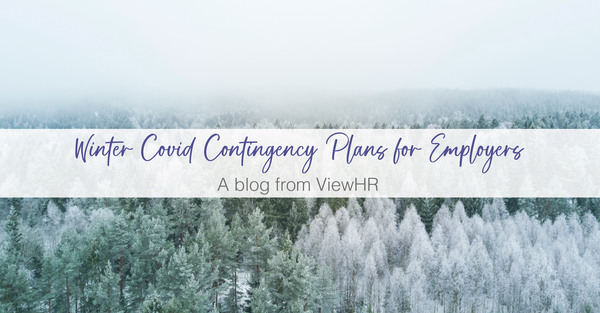Drop off your CV
We serve the global HR community through our offices located in Delhi, Hong Kong, London, New York, São Paulo and Singapore and have placed HR leaders in over 30 countries.
Written by our partners at ViewHRAs the nights in the UK start to draw in and temperatures d...

As the nights in the UK start to draw in and temperatures drop, we are reminded that winter is just around the corner. Whilst scientists have said that the Covid-19 vaccine has weakened the link between infection numbers and fatalities[1], and the UK’s government has lifted the requirement for employees to work at home where possible[2], we do not know what is around the corner, with gov.uk suggesting that some infection control measures may be necessary to protect the NHS[3]. Given these circumstances, many employers will be beginning to think about their winter contingency plans in relation to their employees, in case Covid cases start to rise.
In this blog, we explore some key areas for consideration. Messaging around Covid-safe working We know Covid hasn’t gone away altogether, but the lifting of restrictions in the UK in recent months, combined with the amount of time the pandemic has been ongoing, may lead to complacency regarding Covid-safe working practices. As such, even if you have communicated these measures to your employees previously, regular communication to remind people that Covid-safe working practices are still in place can be important. Measures may include appropriate ventilation, hand hygiene, cleaning, use of PPE, and maintaining social distancing where possible.
Ensure relevant policies are up-to-date Now is a good time to ensure that your sickness absence policy is up-to-date, as you may need to refer to it increasingly over the months ahead. This could include rules around employees coming in to work if they feel unwell, and what pay provisions are in place for different scenarios (e.g. if required to self-isolate). As part of your wellbeing policy, you may also make flu jabs available to employees, or encourage those entitled to receive a Covid or free flu jab from the NHS to take these up (e.g. by giving time off). Whilst this is not something that all employers will automatically be able to do, it can be helpful in promoting well-being and managing overall absence levels. It may also be prudent to review your holiday policy. At the time of writing this blog, the UK had cut its travel red list to seven countries[4], meaning that people are able to travel to a large number of destinations without the need to quarantine on return. This may be subject to sudden change, however, so clear rules on how the employer will handle these scenarios could prove very useful.
Are you WFH-ready? Many employees do not have jobs that can be undertaken from home, however, in workplaces where this is possible, are you work-from-home ready? Things to think about include: Do employees still have access to the same technology and any other equipment at home as previously or have there been changes? If items will need to be collected from the place of work prior to resuming working from home, it may be good to plan how this could be achieved without everybody coming into the place of work at once. Do you have up-to-date contact details for all of your employees when they are not at the office? The lockdown at the start of 2021 was announced on 4th January, which is when many people may still have been taking their Christmas and New Year holidays (and businesses that shut down over that period may still have been closed). As such, being able to contact employees prior to a return to work to advise them of any change in arrangements is important.
Goodbye furlough! The UK government’s Coronavirus Job Retention Scheme (CJRS) came to an end on 30th September 2021[5]. As such, if new government restrictions are introduced, employers and employees cannot rely on furlough leave being available in the future. It may be beneficial for employers to check if their employment contracts have any clauses relating to short-time working and guarantee payments. This is particularly relevant in industries such as hospitality, where the work mostly cannot be done from home, and in the past, government restrictions have resulted in a need for closure. Hopefully, the contingency plans that employers are putting in place currently will not be needed! However, in uncertain times, a contingency plan not used is likely to be preferable to get caught out by a sudden change in circumstances.
If you would like any advice on any of the issues discussed in this blog, please get in touch with a member of the ViewHR team today for an initial discussion: hr@viewhr.co.uk | +44(0)1425 205390 | viewhr.co.uk. ViewHR are UK based on and provides flexible HR support and guidance combined with employment law consultancy. [1] https://www.reuters.com/world/uk/uk-coronavirus-vaccines-have-weakened-link-between-infections-death-says-2021-06-27/ [2] https://www.hse.gov.uk/coronavirus/roadmap-further-guidance.html [3] https://www.gov.uk/government/publications/covid-19-response-autumn-and-winter-plan-2021/covid-19-response-autumn-and-winter-plan-2021 [4] https://www.bbc.co.uk/news/uk-58833088 [5] https://www.bbc.co.uk/news/explainers-52135342
More information is available on the Health and Safety Executive (HSE) website here: https://www.hse.gov.uk/coronavirus/roadmap-further-guidance.html.